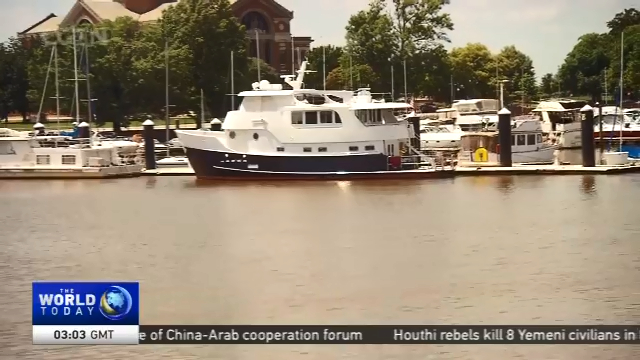
11:48, 10-Jul-2018
China-US Trade Tensions: Boat manufacturers hit with foreign and US tariffs
Updated
11:03, 13-Jul-2018
02:49

Boat manufacturers got hit by a double whammy, foreign tariffs on US-made boats, and US tariffs on the foreign-made metals to make them. Overseas markets can generate as much as a third of some boat-builders revenues. That's got boating manufacturers pushing back hard against Trump's tariffs, saying they will slash billions from their bottom lines. White House correspondent Jessica Stone reports.
Every year, millions of Americans heed the call of the open water. Building the boats that take them there employs more than 650 thousand people. But now a series of tariffs on boats and parts is putting a lot of those jobs in danger.
NICOLE VASILAROS VICE PRESIDENT, NATIONAL MARINE MANUFACTURERS ASSOCIATION "We have members who are looking at lay-offs in the next 60-90 days if things don't change."
It's Nicole Vasilaros' job to help make that change as the boating industry's advocate-in-chief. She and other industry advocates met with U.S. Commerce Secretary Wilbur Ross last week. Her message:
NICOLE VASILAROS VICE PRESIDENT, NATIONAL MARINE MANUFACTURERS ASSOCIATION "This matters to American workers. Many of our businesses did see a benefit of tax reform. All of this trade situation has completely wiped out those benefits."
Because of President Trump's tariffs, U.S.-made boats are getting taxed more heavily when exported to Europe, Canada, and Mexico. U.S. manufacturers are also paying more for foreign-made steel, aluminum, and finished parts.
JESSICA STONE WASHINGTON "Captains are in a unique position to see the immediate impact of these tariffs, because of all of your electronics as well as much of your navigation equipment is made in China and will now be subject to 25% tax when it comes into the United States."
Trump says he's using tariffs to get China and other trading partners to lower trade barriers to U.S. products. Economist Mary Lovely says it's U.S. companies - not foreign ones - who are paying the price.
MARY LOVELY PETERSON INSTITUTE OF INTERNATIONAL ECONOMICS "This approach is fairly useless, but it has an efficiency cost on the U.S. economy. So, therefore, we are doing no good, while incurring potentially unknown cost. So, they make no sense."
Back in the 1980s, Washington imposed tariffs on Japanese products. Companies responded by moving production to the United States. Lovely says that won't work this time.
MARY LOVELY PETERSON INSTITUTE OF INTERNATIONAL ECONOMICS "Unfortunately, the U.S. is a smaller share of the global economy than it was 40 years ago and companies have to think about serving the American market, but also about serving markets abroad."
Vasilaros says Trump's tariffs are leaving uncertainty in their wake when the boating business needs calmer waters.
NICOLE VASILAROS VICE PRESIDENT, NATIONAL MARINE MANUFACTURERS ASSOCIATION "We think that bilateral negotiated trade agreements are the way to do this."
Jessica Stone, CGTN, Washington. (OUT)

SITEMAP
Copyright © 2018 CGTN. Beijing ICP prepared NO.16065310-3
Copyright © 2018 CGTN. Beijing ICP prepared NO.16065310-3